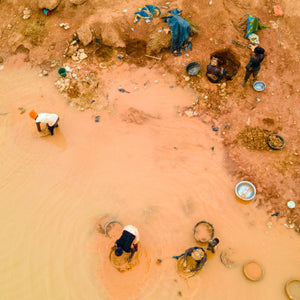6 Shocking Statistics About Child Health in Africa
Child health in Africa is a significant concern across the continent, with millions of children suffering from preventable diseases and inadequate access to healthcare. Despite progress made in recent years, there are still many challenges that need to be addressed to ensure that every child in Africa has access to quality healthcare.
Here, we explore 6 shocking statistics about child health in Africa, highlighting the urgent need for action.
1) Children in sub-Saharan Africa are 14 times more likely to die before they turn 5 than children in developed regions. (WHO)

This horrific statistic epitomizes the devastating state of child health in Africa, and highlights the significant health disparities and challenges faced by many communities in sub-Saharan Africa.
There are numerous factors that contribute to a high death rate amongst children in sub-Saharan Africa, and those factors vary depending on the age of the child.
During the first 28 days of life, also known as the neonatal period, a child's risk of mortality is at its highest. Preterm birth, infections and intrapartum-related complications such as birth asphyxia are the leading causes of neonatal deaths. Shockingly, 45% of all child deaths under the age of 5 years occur during this period.
Preventing these deaths requires the promotion of safe childbirth practices and improving access to effective neonatal care.
Beyond the neonatal period, pneumonia, diarrhea, and malaria are the primary causes of death during the first 5 years of life. Malnutrition is an underlying contributing factor in approximately 45% of all child deaths, increasing children's vulnerability to severe illnesses.
Addressing these issues is crucial to improving child health in Africa, and reducing the number of preventable deaths in the region.
2) Of the global number of children under 5 who die of pneumonia, diarrhea, measles, HIV, tuberculosis and malaria, 50% are in Africa. (UN, 2017)

Every year across the African Region, around 473,000 children die from pneumonia, 300,000 from diarrhea, and 443,000 from malaria. What makes this even more shocking is the fact that these diseases are preventable and treatable - with sufficient access to appropriate and affordable medicines.
Unfortunately, for a significant proportion of Africans, access to potentially life-saving medication remains severely limited. Many African countries lack the technical, financial, or human resources required for high-scale drug production, resulting in 70% of pharmaceutical products being imported from outside of the continent. This can make them unaffordable for average working people, and it’s often the youngest, with their weaker immune systems, who suffer the most as a result.
3) Malnutrition significantly impacts child health in Africa, with one in every three children under the age of five being stunted. (Global Nutrition Report, 2020)

Malnutrition is a significant cause of ill health and death among children in Africa. One way it negatively impacts child health is by causing stunting, a condition where a child's growth is impaired due to poor nutrition and poor health.
Stunting can occur during the first 1,000 days of a child's life, from conception to their second birthday, when their bodies and brains are developing rapidly. During this critical period, malnutrition caused by a lack of essential nutrients can have devastating consequences on a child's development and long-term health.
4) In 2020, 88% of global AIDS-related child deaths were in sub-Saharan Africa. (UNICEF, 2021)
Across sub-Saharan Africa, over 267,000 children were newly infected with HIV in 2020. In the same period, 105,600 children died from AIDS-related causes.
The HIV epidemic has a consistent and significant impact on child health in Africa. HIV-positive children may suffer from weakened immune systems, delayed growth and development, and an increased risk of infections like tuberculosis and malaria. Children are particularly vulnerable to HIV transmission from their mothers during pregnancy, childbirth, or breastfeeding.
The COVID-19 pandemic exacerbated this problem, with many countries experiencing significant disruptions in HIV testing and treatment services. In high burden countries, for example, new treatment initiations for HIV-positive children under 14 fell by 25-50%.
Although some services resumed in June 2020, their coverage remains far lower than pre-COVID, and the full extent of the pandemic’s impact is yet to be seen.
5) 1 in 5 children in Africa don’t receive all the necessary and basic vaccinations. (WHO, 2018)
As a result of this, more than 30 million African children under 5 still suffer from vaccine-preventable diseases (VPDs) every year, and over half a million of these children die from VPDs annually. This represents approximately 58% of global VPD-related deaths.
Vaccination efforts in Africa are often restricted for a number of reasons. Lack of access to healthcare is a major issue, particularly for families living in remote or rural areas. Poverty and a limited awareness of the importance of vaccination can also be significant barriers.
To improve vaccination rates in Africa, national immunization programs are being implemented, and innovative approaches to vaccine delivery are being utilized. However, there is still much work to be done to ensure that all children have access to life-saving vaccines.
How we can improve the state of child health in Africa
The statistics above emphasize the urgent need for action to improve it by addressing issues such as neonatal mortality, pneumonia, diarrhea, malaria, malnutrition, HIV/AIDS and inadequate access to vaccinations. This requires a multifaceted approach.
Governments and international organizations need to invest in healthcare infrastructure, promote safe childbirth practices, improve access to effective neonatal care, and provide affordable medicines. Ultimately, ensuring that every child in Africa has access to quality healthcare is crucial to improving child health outcomes and reducing the number of preventable deaths in the region.


